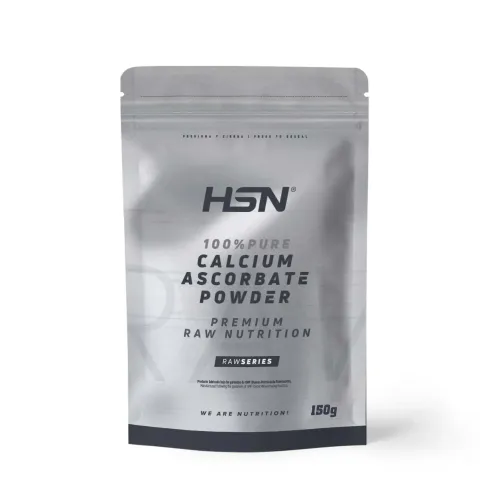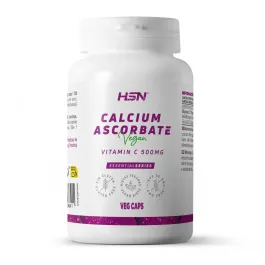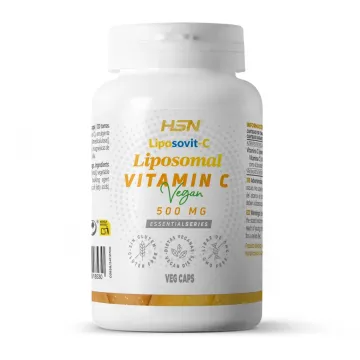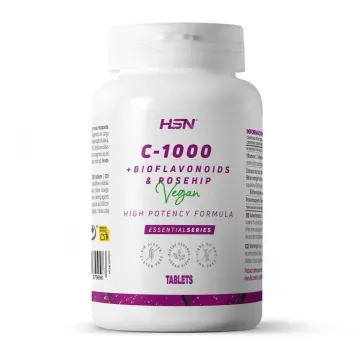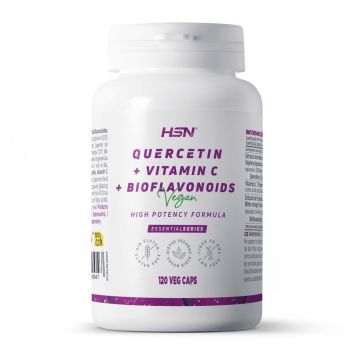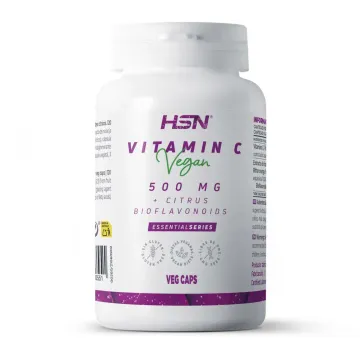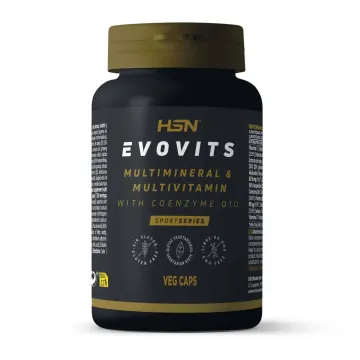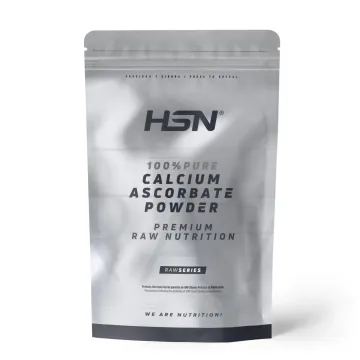- Vitamin C in calcium salt form - Anionic form (ascorbate) calcium.
- In 100% pure powder, much easier to dose according to your needs.
- High content of 82% elemental vitamin C.
- Non-acidic Vitamin C - Alkalinized.
- Powerful antioxidant protected by calcium salt - Less oxidizable than pure vitamin C.
- Water soluble, thanks to the calcium ascorbate form, it integrates better into drinking solutions.
- 100% pure line - No additives, no fillers, just pure raw material.
Calcium Ascorbate - A Form of Vitamin C
Calcium Ascorbate (Vitamin C) Powder from RawSeries is a dietary supplement in powder format developed solely and exclusively from the pure raw material of vitamin C in anionic form (ascorbate) and calcium salt (calcium ascorbate), without additives or fillers.
Vitamin C is a powerful and recognized dietary antioxidant, and as such, its consumption is important since it is also nutritionally essential. The calcium ascorbate form is known to be a more stable and protected presentation compared to traditional ascorbic acid. Additionally, HSN's '100% Pure' presentation allows you to enjoy all the benefits of the authentic raw material of calcium ascorbate, with no additional additives.
Calcium ascorbate is a valid and effective form of supplementing vitamin C in your diet.
Enjoy RAW Powder Product Without Additives
Calcium Ascorbate - What Is It?
Calcium ascorbate is a calcium salt of vitamin C, but what does that mean?
Vitamin C is an acid, specifically ascorbic acid. This ascorbic acid can react with other elements to conjugate it, as happens with calcium; from this interaction comes calcium ascorbate.
Ascorbic acid is alkalinized when combined with calcium carbonate salt, turning into ascorbate; specifically: calcium ascorbate.
Calcium ascorbate arises from the combination of ascorbic acid with calcium carbonate in a solution that is heated over a variable period under specific conditions, to generate calcium ascorbate as the final product, an alkaline version of ascorbic acid, and more stable against environmental stress.
Vitamin C and Calcium Ascorbate, What Are the Differences?
As previously indicated, calcium ascorbate is a pH-regulated form of ascorbic acid, which thanks to its combination with calcium, significantly improves its environmental stability.
Biologically, calcium ascorbate provides the same properties as ascorbic acid regarding the effects of vitamin C, as it acts the same way, making calcium ascorbate an excellent alternative option to ascorbic acid for supplementing vitamin C in your diet.
The main virtue of calcium ascorbate is that since it is no longer an acidic presentation of Vitamin C, the powder format is gentler on aspects such as enamel, which is one of the reasons many people avoid using vitamin C powder, as constant acid can affect enamel in the long run. With calcium ascorbate, there is no risk of dental damage at any level, as it is not acidic vitamin C.
100% Pure - The Assertion of HSN's RAW Range
At HSN we work with different product ranges of our brand, such as Sports, Essentials, Food, or RAW.
Raw is a line of pure products, where we only offer the authentic raw material of the compound you seek; and this line was born many years ago after noticing that a sector of users was concerned about the consumption of additives in formulas, or wanted pure products to avoid flavors or scents; or to combine with other products, pure or already flavored, and prepare their own formulas.
We have asserted the origin of our RawSeries brand with our '100% Pure', a reinforcement of the concept that manifests the offering of products without additives, without fillers, only the pure raw material, such as our calcium ascorbate among many other products.
Enjoy unique raw materials, with completely pure products, ideal for combining with other dietary supplements of your interest and preparing your own combinations adapted to your needs and goals.
No Additives, No Fillers, Just Pure Raw Material
HSN's calcium ascorbate powder has been developed solely with calcium ascorbate salt, it contains no additional additives in its composition, only the pure raw material in powder form.
High Vitamin C Content in a Convenient Form
The base vitamin C content of calcium ascorbate is not 100%, meaning it is not like ascorbic acid where 100% of the powder content (as long as it is pure) is vitamin C.
In calcium ascorbate salt there is calcium, specifically, in our raw material 82% is pure vitamin C.
This is why a recommended intake of 600mg of calcium ascorbate powder provides almost 500mg of elemental vitamin C, specifically 492.9mg, which is a high daily intake in a simple and hassle-free way.
No Additives or Flavor - Ideal for Mixing with Other Antioxidants
You can combine calcium ascorbate with other dietary supplements, especially with iron, as vitamin C helps with intestinal absorption of iron; even so, it is completely compatible with other supplements of any kind.
Thanks to its flavorless condition, being the pure raw material without additives or aromas, it is very easy to combine with other raw supplements, to prepare your own homemade blends adapted to individual needs and interests.
Calcium ascorbate is especially combined with: Hydrolyzed Collagen, L-Lysine Powder, D-Ribose Powder; as well as being used along with other recognized antioxidants such as PQQ, NADH, Ubiquinone, or Ubiquinol and vitamins like E or minerals like copper.
Properties of Calcium Ascorbate
The properties of calcium ascorbate are shared with vitamin C, as most of its effects derive from its elemental content in this vitamin, so from its consumption, we can expect a high antioxidant potency, thanks to which calcium ascorbate helps protect cells against oxidative damage.
Vitamin C is also important for the normal formation of collagen, for the proper functioning of the immune system, and for energy metabolism, among other effects.
Calcium Ascorbate and Other Forms of Vitamin C
When deciding whether to use ascorbic acid or calcium ascorbate, you should consider that the properties of both compounds are shared and your decision will depend on whether you care that each milligram of product is a milligram of pure vitamin C (for which you need to use the pure base form of ascorbic acid), or if you don't mind the small calcium content in calcium ascorbate in order to avoid consuming an acidic food that can damage your enamel in the long run if used in RAW form.
Bibliographic References
- Pullar, J. M., Carr, A. C., & Vissers, M. C. M. (2017). The roles of vitamin C in skin health. Nutrients, 9(8).
- Schleicher, R. L., Carroll, M. D., Ford, E. S., & Lacher, D. A. (2009). Serum vitamin C and the prevalence of vitamin C deficiency in the United States: 2003-2004 National Health and Nutrition Examination Survey (NHANES). American Journal of Clinical Nutrition, 90(5), 1252–1263.
- Wilkinson, M., Hart, A., Milan, S. J., & Sugumar, K. (2014). Vitamins C and E for asthma and exercise-induced bronchoconstriction. Cochrane Database of Systematic Reviews, 2014(6), CD010749.
- Carr, A. C., & Maggini, S. (2017). Vitamin C and immune function. Nutrients, 9(11).
- Hemilä, H., & Chalker, E. (2013). Vitamin C for preventing and treating the common cold. Cochrane Database of Systematic Reviews, 2013(1).
 Before
Before After
After During
During Morning
Morning Afternoon
Afternoon Night
Night








